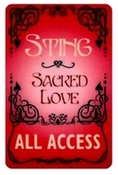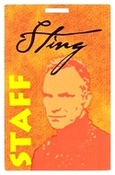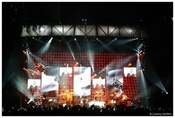
Sting sings tepid funk: Fans adoring. Songwritng talent died with Police...
Sting last night delivered dull, melody-free dross like This War and a seemingly interminable Sacred Songs that battled it out with brief moments of excitement like Englishman in New York.
To disappoint his adoring fans at this point in his career, Sting would have to strangle a puppy on stage. And even then, the rich, cool, charismatic Gordon Sumner, Commander of the British Empire, might somehow get away with it.
Ask any of the 3,000 thoroughly pumped-up devotees who attended the singer's sold-out show at Salle Wilfrid-Pelletier of Place des Arts last night, and they'll probably tell you it was a spiritual experience. These are, in fact, the people who delivered a standing ovation after the first song, a tepid jazz-lite version of the Police classic 'Walking On the Moon'.
But if you've always suspected Sting's post-Police career has been primarily a celebration of his utter fabulousness - and that his songwriting talent more or less died with his original group - last night's show would not have changed your mind.
The problem became alarmingly clear immediately after that initial standing O, as Sting delivered four clunkers from his most recent album, the dreadful Sacred Songs.
Smart, imaginative visuals on giant screens gussied up the presentation of each song.
But there was no masking the fact that 'Send Your Love', 'Inside', 'Forget About the Future' and 'Dead Man's Rope' are typically turgid examples of the kind of tuneless funk and featherweight pop that passes for songcraft in the Sting catalogue these days.
As if to underline the diminishing-returns factor himself, a hard-rocking version of another Police classic followed - and 'Synchronicity II', released in 1983, was, indeed, the high point of the evening. It was a momento of Sting at the top of his game, rocking hard and spitting out solid hooks.
Things stayed almost on track as backup singer Joy Rose joined Sting for a genuinely fiery duet of 'Whenever I Say Your Name', with Rose actually trumping Mary J. Blige's performance on the studio version. The chemistry between the two was sweet, Rose's pipes were astounding on the extended ending and the audience cheered lustily. But the dirty little secret was out again: no song.
And so it went: dull, melody-free dross like 'This War' and a seemingly-interminable 'Sacred Songs' battled it out with brief moments of excitement like 'Englishman In New York' and an extended, but faithful 'Roxanne'. While the difference was dramatic, the audience made little distinction between the old and the new, delivering a steady stream of screams and cheers and jumping on their feet at regular intervals.
Sting's seven-piece backup band delivering solid, if unspectacular, accompaniment - perfect shading, in fact, for a singer who might have stopped being an artist to settle in for a lifetime of adult-contemporary product, suitable for car commercials.
He's not the first. Look what complacency and underachieving have done for Rod Stewart, the Rolling Stones and Elton John, among others. And, please, don't use the word ''maturing.'' If maturing means losing the muse, it's time to blow the dust off that copy of 'Reggatta De Blanc'.
(c) Montreal Gazette by Bernard Perusse
Sting tel qu'en lui-même...
Spectacle intimiste hier à la Salle Wilfrid-Pelletier de la Place des Arts. Intimiste, oui, vous avez bien lu. On aurait pu être au Centre Bell, mais c'est à la PdA que Sting a choisi d'honorer 3000 fans finis (2952 pour être exact) dans un unique spectacle à guichets fermés hier soir. Histoire, sans doute, d'appâter les absents pour la tournée de l'été avec Annie Lennox, au Centre Bell justement. En attendant, on l'a eu pour nous tout seuls.
On dira ce qu'on voudra de cette salle, quand on veut que quelque chose s'y passe, on peut, la preuve: ça s'est passé hier. Il faut dire que la salle voulait beaucoup, beaucoup. Chris Botti, le très miles-davisien trompettiste qui assurait la première partie, a même eu droit à une ovation, c'est dire. Il ne détonnait pas du tout avec ce qui allait suivre, d'ailleurs, même qu'il avait une certaine ressemblance physique (en plus jeune) avec celui que tout le monde attendait.
Le beau Sting lui-même s'est donc amené une demi-heure de trompette et un petit entracte après. En fond de scène, trois écrans rectangulaires disposés côte à côte, c'est tout. Sobriété toute britannique. Et Sting, mince et juvénile dans sa chemise noire à col et poignets blancs, a enlacé une contrebasse pour chanter 'Walking on the Moon'. Habile entrée en matière s'il en est: d'abord, les filles ont toutes envie d'être sa contrebasse, et puis combien de personnes étaient là, hier, pour le dernier disque du bel Anglais, 'Sacred Love'? En tout cas, toute la salle s'est levée comme un seul homme, et il a fallu attendre 'Synchronicity II' pour revoir ça, soit cinq chansons plus loin, toutes tirées de son dernier album. Pas de mauvaises chansons mais, comment dire? On reste un peu sur sa faim. Il y a à la fois trop de bruit et pas assez d'âme, et on se demande ce qui s'est passé avec l'homme de 'Fragile', mettons. Peut-être que l'effet de surprise des premiers tubes s'est estompé? On peut le croire. On dirait qu'il se répte, qu'il essaie de refaire ce qui a bien marché avant. évidemment, les inconditionnels sont ravis puisqu'il retrouvent leur Sting tel qu'en lui-même. En plus, il a eu l'élégance de ne s'adresser à la foule qu'en français (oh, cet accent!), ce qui ne pouvait que conquérir les sceptiques, s'il y en avait.
Quelques nouvelles chansons comme la très gospel 'Whenever I Say Your Name', que Sting chante en duo avec sa choriste Joy Rose, ou la très triste 'Dead Man's Rope', donnent tout de même de bons frissons. D'autres tombent franchement à plat, comme 'This War', dénonçant la guerre en Irak, lourdement appuyée de projections à mi-chemin entre le réalisme soviétique et le pop-art. Mais vite, vite, l'habile stratège a enchané avec 'Fragile', et le tour était joué: il avait la salle dans sa poche. Plus personne n'allait se rasseoir jusqu'à la fin du second rappel.
(c) La Presse by Fabienne Couturier
Sting last night delivered dull, melody-free dross like This War and a seemingly interminable Sacred Songs that battled it out with brief moments of excitement like Englishman in New York.
To disappoint his adoring fans at this point in his career, Sting would have to strangle a puppy on stage. And even then, the rich, cool, charismatic Gordon Sumner, Commander of the British Empire, might somehow get away with it.
Ask any of the 3,000 thoroughly pumped-up devotees who attended the singer's sold-out show at Salle Wilfrid-Pelletier of Place des Arts last night, and they'll probably tell you it was a spiritual experience. These are, in fact, the people who delivered a standing ovation after the first song, a tepid jazz-lite version of the Police classic 'Walking On the Moon'.
But if you've always suspected Sting's post-Police career has been primarily a celebration of his utter fabulousness - and that his songwriting talent more or less died with his original group - last night's show would not have changed your mind.
The problem became alarmingly clear immediately after that initial standing O, as Sting delivered four clunkers from his most recent album, the dreadful Sacred Songs.
Smart, imaginative visuals on giant screens gussied up the presentation of each song.
But there was no masking the fact that 'Send Your Love', 'Inside', 'Forget About the Future' and 'Dead Man's Rope' are typically turgid examples of the kind of tuneless funk and featherweight pop that passes for songcraft in the Sting catalogue these days.
As if to underline the diminishing-returns factor himself, a hard-rocking version of another Police classic followed - and 'Synchronicity II', released in 1983, was, indeed, the high point of the evening. It was a momento of Sting at the top of his game, rocking hard and spitting out solid hooks.
Things stayed almost on track as backup singer Joy Rose joined Sting for a genuinely fiery duet of 'Whenever I Say Your Name', with Rose actually trumping Mary J. Blige's performance on the studio version. The chemistry between the two was sweet, Rose's pipes were astounding on the extended ending and the audience cheered lustily. But the dirty little secret was out again: no song.
And so it went: dull, melody-free dross like 'This War' and a seemingly-interminable 'Sacred Songs' battled it out with brief moments of excitement like 'Englishman In New York' and an extended, but faithful 'Roxanne'. While the difference was dramatic, the audience made little distinction between the old and the new, delivering a steady stream of screams and cheers and jumping on their feet at regular intervals.
Sting's seven-piece backup band delivering solid, if unspectacular, accompaniment - perfect shading, in fact, for a singer who might have stopped being an artist to settle in for a lifetime of adult-contemporary product, suitable for car commercials.
He's not the first. Look what complacency and underachieving have done for Rod Stewart, the Rolling Stones and Elton John, among others. And, please, don't use the word ''maturing.'' If maturing means losing the muse, it's time to blow the dust off that copy of 'Reggatta De Blanc'.
(c) Montreal Gazette by Bernard Perusse
Sting tel qu'en lui-même...
Spectacle intimiste hier à la Salle Wilfrid-Pelletier de la Place des Arts. Intimiste, oui, vous avez bien lu. On aurait pu être au Centre Bell, mais c'est à la PdA que Sting a choisi d'honorer 3000 fans finis (2952 pour être exact) dans un unique spectacle à guichets fermés hier soir. Histoire, sans doute, d'appâter les absents pour la tournée de l'été avec Annie Lennox, au Centre Bell justement. En attendant, on l'a eu pour nous tout seuls.
On dira ce qu'on voudra de cette salle, quand on veut que quelque chose s'y passe, on peut, la preuve: ça s'est passé hier. Il faut dire que la salle voulait beaucoup, beaucoup. Chris Botti, le très miles-davisien trompettiste qui assurait la première partie, a même eu droit à une ovation, c'est dire. Il ne détonnait pas du tout avec ce qui allait suivre, d'ailleurs, même qu'il avait une certaine ressemblance physique (en plus jeune) avec celui que tout le monde attendait.
Le beau Sting lui-même s'est donc amené une demi-heure de trompette et un petit entracte après. En fond de scène, trois écrans rectangulaires disposés côte à côte, c'est tout. Sobriété toute britannique. Et Sting, mince et juvénile dans sa chemise noire à col et poignets blancs, a enlacé une contrebasse pour chanter 'Walking on the Moon'. Habile entrée en matière s'il en est: d'abord, les filles ont toutes envie d'être sa contrebasse, et puis combien de personnes étaient là, hier, pour le dernier disque du bel Anglais, 'Sacred Love'? En tout cas, toute la salle s'est levée comme un seul homme, et il a fallu attendre 'Synchronicity II' pour revoir ça, soit cinq chansons plus loin, toutes tirées de son dernier album. Pas de mauvaises chansons mais, comment dire? On reste un peu sur sa faim. Il y a à la fois trop de bruit et pas assez d'âme, et on se demande ce qui s'est passé avec l'homme de 'Fragile', mettons. Peut-être que l'effet de surprise des premiers tubes s'est estompé? On peut le croire. On dirait qu'il se répte, qu'il essaie de refaire ce qui a bien marché avant. évidemment, les inconditionnels sont ravis puisqu'il retrouvent leur Sting tel qu'en lui-même. En plus, il a eu l'élégance de ne s'adresser à la foule qu'en français (oh, cet accent!), ce qui ne pouvait que conquérir les sceptiques, s'il y en avait.
Quelques nouvelles chansons comme la très gospel 'Whenever I Say Your Name', que Sting chante en duo avec sa choriste Joy Rose, ou la très triste 'Dead Man's Rope', donnent tout de même de bons frissons. D'autres tombent franchement à plat, comme 'This War', dénonçant la guerre en Irak, lourdement appuyée de projections à mi-chemin entre le réalisme soviétique et le pop-art. Mais vite, vite, l'habile stratège a enchané avec 'Fragile', et le tour était joué: il avait la salle dans sa poche. Plus personne n'allait se rasseoir jusqu'à la fin du second rappel.
(c) La Presse by Fabienne Couturier
March 22, 2004
SET LIST
- Walking On The Moon
- Send Your Love
- Inside
- Forget About The Future
- Dead Man's Rope
- Synchronicity II
- Whenever I Say Your Name
- I Was Brought To My Senses
- This War
- Fragile
- Fields Of Gold
- Stolen Car (Take Me Dancing)
- Sacred Love
- Englishman In New York
- Roxanne
- The Bed's Too Big Without You
- Never Coming Home
- Desert Rose
- If I Ever Lose My Faith In You
- Every Breath You Take
- A Thousand Years








